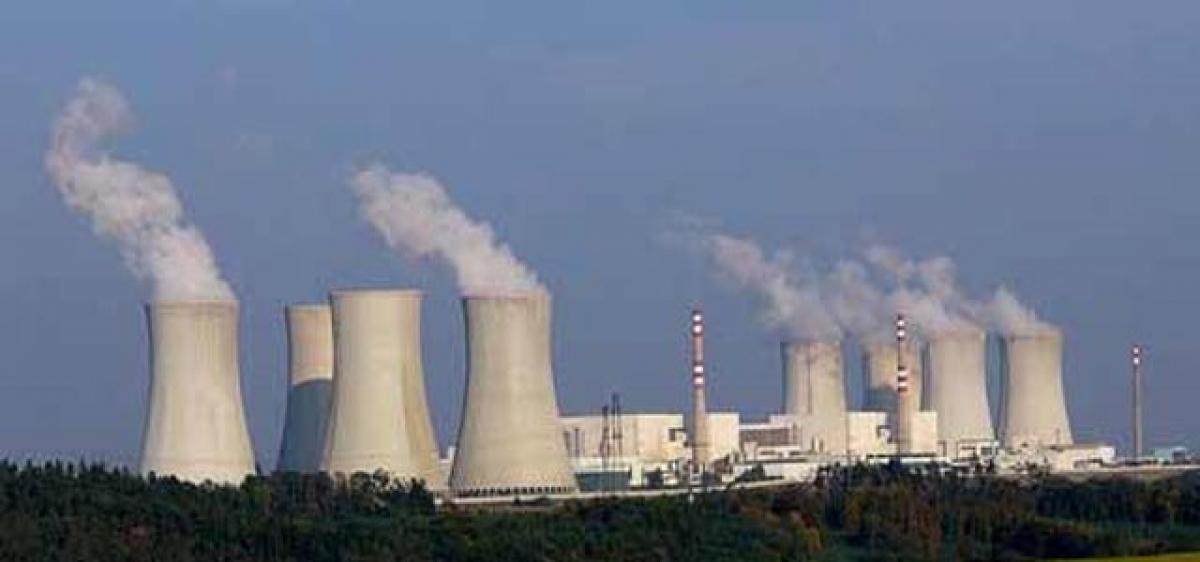Live
- Rekhachithram Review: An inventive thriller that blends nostalgia and mystery
- India Open 2025: Indian challenge ends as Satwik-Chirag go down in semi-finals
- Israel intercepts missile fired from Yemen toward Red Sea's Eilat
- Pravinkoodu Shappu Review: Pravinkoodu Shappu impresses with its visuals and performances but doesn't fully fulfill its potential
- Do not breach party discipline, No loose talk about party positions -Bhandari
- 'Celebrities and village sarpanch not safe, what about common people': Cong slams MahaYuti govt
- Lebanese President urges Israeli withdrawal from South Lebanon within deadline
- Legacy of NTR Lives On: Tributes Pour in on His 29th Death Anniversary
- 8th International Kite Festival Takes Flight at Mangaluru
- Kho Kho WC: India-W set up final clash vs Nepal with commanding win over South Africa-W
Just In

For long a pariah in the global nuclear technology market, Indian policymakers are pleasantly discovering how the boot is on the other foot as they are furiously courted by foreign firms themselves facing financial ruin.
For long a pariah in the global nuclear technology market, Indian policymakers are pleasantly discovering how the boot is on the other foot as they are furiously courted by foreign firms themselves facing financial ruin.
American nuclear giant Westinghouse, which is in talks with the Indian government on a proposed project in Andhra Pradesh, filed for bankruptcy earlier this month. A year ago, the French energy major Areva, which has offered to build reactors at a Maharashtra site, began a process of major restructuring following huge losses.
Westinghouse is proposing to build six reactors of 1,000 MW capacity each at Kovvada in coastal Andhra Pradesh. The government has indicated this site in place of the originally proposed Mithi Virdi in Gujarat, where the local population protested against plans to erect a nuclear plant in their area.
"I don't understand why the government is so keen to talk to these nuclear power companies that are in major financial difficulty, unless it is to bail them out," former Union Power Secretary EAS Sarma told IANS.
Sarma said there are also concerns about the fuel for the reactors to be supplied as per contractual practice, by a financially crippled Westinghouse. "Westinghouse has sold its fuel fabrication facility to the Chinese and so our fuel will come from the latter, which is a cause for concern, and I have written to the government on this," the former Secretary said.
The case of Areva, which is proposing six EPR-type 1,650 MW reactors at Jaitapur, is even more complex, with the French firm having signed the agreements with Larsen & Toubro and state-run Nuclear Power Corp during Prime Minister Narendra Modi's France visit in 2015. Soon after, Areva declared massive losses of 4.8 billion euros and the French government, which owns 87 per cent of the company, announced its nuclear power arm would be sold to another state-run firm, EDF.
Sarma pointed out that Areva has struggled to complete two identical EPR reactors, one at Olkiluoto in Finland, which is still not operational despite over a decade-long delay and a trebling of costs, and the other in Flamanville, France, plagued by serious construction and security issues, delays and massive cost over-runs.
"The French nuclear security watchdog has issued a number of severe warnings to Areva on major security issues and manufacturing and construction flaws in the reactor being built in Flamanville," Sarma said. Flamanville is one of four EPRs under construction worldwide, and its cost overrun – from an estimated 3.3 billion euros to over 10 billion euros – is at the heart of Areva's current problems.
"Now with their current troubles, there is even more likelihood of Areva compromising on design safety features, on which they have such poor track record," Sarma said. M R Srinivasan, a former Secretary to the Union government and ex-Chairman of the Atomic Energy Commission, is equally concerned about the time-delays and cost-escalations involved in closing the deals with these beleagured foreign companies.
"Both these proposals are facing great uncertainty. Toshiba (the Westinghouse parent) is in serious financial difficulty, while Areva is undergoing major restucturing," Srinivasan said. "Some technical discussions are on, but the issue of financing will surely come up owing to concerns about cost-escalation," he said.
According to Sarma, in the changed situation, "Westinghouse itself says it can only supply the technology for the nuclear island and does not want to undertake any construction activity." This is a complete reversal of the situation that prevailed before an agreement with the US in 2008 allowed India to engage in nuclear commerce and start importing uranium fuel again for its reactors.
Srinivasan said that in a world where multilateral financing is absolutely scarce for nuclear projects, which have long gestation periods, old allies Russia, whose state-run Rosatom is constructing the Kudankulam Nuclear Power Project in Tamil Nadu, provides a tried, tested and less expensive option.
"That is why we are going ahead with the Russians on more Kudankulam units -- 3,4,5 and 6. The agreements with Russia also have provision for government financing," he said. "All the Russian built units at Kudankulam, including the first and second, are 'Generation 3 plus' reactors. They meet all current safety requirements," Srinivasan said. "Their design has benefited from the review conducted of nuclear accidents like Three-Mile Island (US) and Fukushima (Japan)," he added.
By Biswajit Choudhury

© 2025 Hyderabad Media House Limited/The Hans India. All rights reserved. Powered by hocalwire.com







